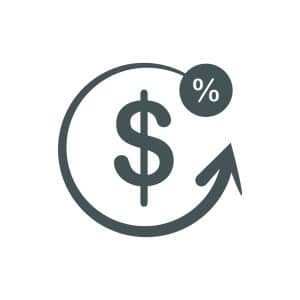Broker and agent commissions are starting to slip in Boston and the trend looks likely to continue.
“The continued rise in home prices has facilitated the elevation of real estate earnings based on commissions,” according to the 2017 NAR DANGER report. “Those earnings have not gone unnoticed by consumers, who are responding by placing increased pressure on real estate agents to reduce their commission rates.”
Most Massachusetts homeowners know their home values have risen in the last decade – for many of them those values have increased considerably. For example, the median price of a single-family home in Belmont in 2007 was $707,500 year to date through July; in 2017 it is over $1.02 million, according to The Warren Group, publisher of Banker & Tradesman. An agent listing an average Belmont home in 2007 could expect to earn around $35,375 on the sale. Today that agent would earn $51,000 – and the house is likely sell much faster in today’s market.
The biggest disruptor in the market – and a big threat to real estate agent commissions – is Redfin, whose successful IPO a couple of weeks ago made it a $2 billion company. The company says its technology frees up so much of the agent’s time, they sell four times as many homes as the average agent. Thus they can afford to charge sellers just 1.5 percent to list a home (plus whatever the seller pays a buyer’s agent).
Redfin found in a May 2017 homebuyer survey that “just over half (51 percent) of buyers (excluding those who worked with Redfin agents) received savings from their agent in the form of a commission refund, a closing-cost contribution or another type of savings. That’s up from 49 percent in December and from 46 percent a year ago.”
“One thing that’s been challenging to explain to consumers is: it is possible to get better service and better value,” said Adam Welling, a Redfin broker in Boston. “You get what you pay for and you get quite a lot with Redfin.”
Welling said his agents sell homes faster and for more money by getting them more exposure through the Redfin website and others. He said 75 percent of Redfin listings sell in 90 days or less. The industry average is 69 percent.
Downward Pressure
A review of MLS data on 733 home sales in Waltham, Lexington and Melrose between Jan. 1 and July 31, 2017, showed that homes that offered less than 2.5 percent commission to co-brokers took a day or two longer to sell on average, but the ratio of actual sale price to list price was also 1 percent to 2 percent less.
Most homes sold in around 20 days for very close to asking price – but 1 percent to 2 percent of a million-dollar home translates to $10,000 to $20,000 in commission, which shows there is still an advantage for sellers to offer co-brokers the going rate.
“This change is coming,” Welling said. “Where sellers are asking for discounts, you’re seeing that downward pressure.”
Redfin claims to save their clients $8,500 on average when buying and selling with their agents.
Buyers nationwide are starting to negotiate lower commissions, according to Simon Ru, CEO of UpNest, an online platform based in San Francisco that connects home sellers with prospective agents in the area who are willing to compete for the listing by lowering their commissions. He said he works with agents in Boston who have closed deals through him as well.
“Consumers are frustrated. All of the information is online, so why pay 6 percent in commissions?” Ru said. “That’s about $60,000 in the San Francisco market. Agents feel the threat from discount brokers, but they don’t want to publicly advertise they will work for less, which might cannibalize their existing base.”
Ru came up with the idea for the business when his father was ready to sell his home a few years ago. Prospective agents wanted a 6 percent commission. Ru negotiated it down to 4.5 percent and the house sold for $1.3 million, saving his father $19,500.
Ru said nationwide homeowners who connect with agents through UpNest save about $6,000 on average. The company offer rebates to homebuyers as well. The company opened in 2012 and facilitated over $1 billion in transactions in the last 12 months.
Participating agents are vetted for quality before they are allowed to participate.
“We don’t want to have a race to the bottom situation, so we have a detailed RFP process that agents go through,” Ru said. “We check reviews, how many homes they’ve sold, what services they offer.”
Listing Only
In Greater Boston’s white-hot real estate market, homes that are priced fly off the shelves shortly after they hit the MLS – and sellers are taking note.
“We’re seeing FSBOs hovering in the 2 to 3 percent of all listings,” said Darin Thompson, broker/owner of Stuart St. James Thompson. “It’s going up, but we’re not seeing double-digit growth. More and more sellers have learned if they can get their listing in the MLS system and get that exposure on third-party sites, it will sell if they price it properly.”
In addition to more traditional real estate services, Thompson also offers home sellers listing-only services for as little as $5 per day, plus additional services à la carte, and he says that part of his business is growing.
Traditional agents in Greater Boston confirm that there is some localized downward pressure on real estate commissions, but they maintain that a skilled agent can communicate their value to a potential seller.
“The number one threat to the industry is incompetent, lazy agents,” said Linda O’Koniewski, co-owner of RE/MAX Leading Edge. “I think 60 to 70 percent of agents fall into this category and those agents should make less money. My agents are getting their fees. People will always pay for quality representation.”
O’Koniewski instructs her agents not to blindly accept a co-broker fee that’s lower than the industry standard. Agents can encourage their buyers to include language in their offers that raises the buyer’s agent’s compensation.
Good agents don’t cost sellers more money – they make sellers more money, said Anthony Lamacchia, broker/owner of Lamacchia Realty.
“You’ve got to be able to explain your value and actually provide it,” he said. “Expertise matters. In this market, most Realtors can sell a house, but good agents will sell it faster and for more money and give sellers better advice. People still do better with good Realtors.”
When the market inevitably slows, Lamacchia predicts sellers will rediscover their respect for the role agents play in the real estate process – and be happy to compensate them accordingly.
“It’s typical. The hotter the market gets, the stronger the downward pressure is,” he said. “Let the market cool down and watch what happens.”







